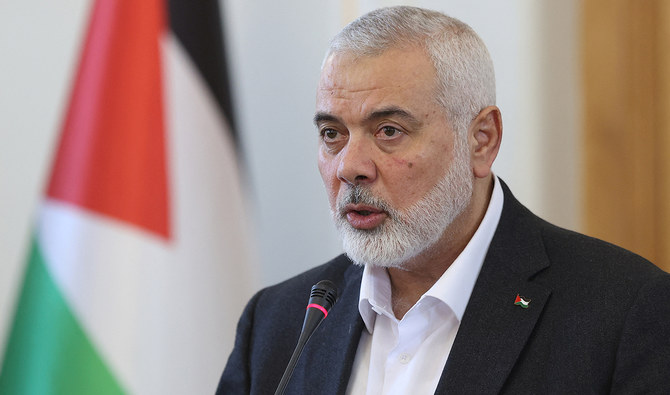GAZA STRIP, Palestinian Territories: Hamas chief Ismail Haniyeh insisted that the death of three of his sons in an Israeli air strike would not influence truce talks in Gaza, as bombardments on Thursday rocked the Palestinian territory.
Israel confirmed the killings, which came as talks in Cairo for a temporary ceasefire and hostage release deal drag on without signs of a breakthrough.
Speaking to Qatari broadcaster Al Jazeera, Haniyeh suggested that the strike, which also killed four of his grandchildren, was an attempt to shift Hamas’s negotiating stance.
“If they think that this will force Hamas to change its positions, they are delusional,” he said.
US President Joe Biden said Hamas “needs to move” on the latest truce proposal, which the militant group has said it is studying.
Israel’s main international ally the United States has also been ramping up pressure on Prime Minister Benjamin Netanyahu to agree to a truce, increase the amount of aid flowing into the besieged Gaza Strip and abandon plans to invade the southern city of Rafah.
Biden labelled Netanyahu’s handling of the war a “mistake” in an interview broadcast on Tuesday, before warning on Wednesday that Israel has not allowed enough aid into the territory.
Despite calls for a ceasefire, Israel carried out strikes early Thursday in the Gaza Strip, particularly in the south of the territory, witnesses said.
The war broke out with Hamas’s October 7 attack against Israel, which resulted in the deaths of 1,170 people, mostly civilians, according to Israeli figures.
Palestinian militants also took about 250 hostages, 129 of whom remain in Gaza, including 34 the Israeli army says are dead.
Israel’s retaliatory offensive has killed at least 33,482 people in Gaza, mostly women and children, according to the Hamas-run territory’s health ministry.
Talks mediated by the United States, Egypt and Qatar have been ongoing since Sunday.
Hamas spokesman in Doha Hossam Badran said: “Hamas is studying the offer presented... It has not responded yet.”
A framework being circulated would halt fighting for six weeks and see the exchange of about 40 hostages for hundreds of Palestinian prisoners.
Biden, speaking at a news conference on Wednesday, said: “It’s now up to Hamas, they need to move on the proposal that’s been made.”
There has been a growing chorus of international criticism aimed at Israel’s handling of the war and the paucity of aid entering the territory.
On Wednesday, Spanish Prime Minister Pedro Sanchez warned that what he called Israel’s “disproportionate response” in Gaza risked “destabilising the Middle East, and as a consequence, the entire world.”
Spain is among several Western nations, including Ireland and Australia, to have suggested they would recognize a Palestinian state in the near future as a starting point for wider peace talks.
Israeli war cabinet member Benny Gantz said that militarily “Hamas is defeated” but pledged to continue fighting “what remains of it,” including in the years to come.
He also echoed Netanyahu’s vows to enter the southern city Rafah, despite growing international concern for the civilians there. “We will enter Rafah. We will return to Khan Yunis,” he said.
More than 1.5 million civilians are sheltering from the war in Rafah, the last Gazan city yet to face an Israeli ground incursion.
The United States has repeatedly warned against an attack on Rafah.
Evidencing his growing frustration with the hawkish Netanyahu, Biden has issued some of his sternest criticism yet of the war.
“I think what he’s doing is a mistake,” Biden told the US network Univision in an interview that aired on Tuesday night.
He urged Netanyahu to “just call for a ceasefire, allow for the next six, eight weeks, total access to all food and medicine going into” Gaza.
Washington’s tougher line on aid has brought some results, the US Agency for International Development said.
Recent days had seen a “sea change” in aid deliveries, said USAID administrator Samantha Power, although she insisted Israel needs to do more.
On Wednesday, Israeli Defense Minister Yoav Gallant said Israel would “flood Gaza with aid,” using a new crossing point on its northern border, streamlined checks and two new routes organized with Jordan.
He said they expected to hit 500 aid trucks entering Gaza a day, which would match the average level of aid and commercial trucks reaching the territory before the war.
The war in Gaza has raised fears that conflict could engulf the wider region.
Iran’s supreme leader Ayatollah Ali Khamenei warned Israel on Wednesday that it “must be punished and will be punished” for a strike on the Iranian consulate in Damascus last week that Tehran has blamed on Israel.
Israeli Foreign Minister Israel Katz replied with a Persian-language post saying: “If Iran attacks from its territory, Israel will respond and attack Iran.”
In response to Iran’s threats, Biden on Wednesday promised “ironclad” support to Israel.
“As I told Prime Minister Netanyahu, our commitment to Israel’s security against these threats from Iran and its proxies is ironclad,” Biden said.
German airline Lufthansa on Wednesday announced it had suspended flights to and from Tehran, probably until Thursday, saying it was “due to the current situation in the Middle East.”
























